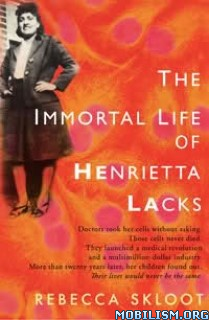
TITLE: The Immortal Life of Henrietta Lacks
AUTHOR: Rebecca Skloot
GENRE: Non Fiction, Biography
PUBLISHED: January 2010
RATING: ★★★★★
PURCHASE LINKS Amazon Kobo Books iBook Store Barnes & Noble
MOBILISM LINK: Removed
Description:
Her name was Henrietta Lacks, but scientists know her as HeLa. She was a poor Southern tobacco farmer who worked the same land as her slave ancestors, yet her cells—taken without her knowledge—became one of the most important tools in medicine. The first “immortal” human cells grown in culture, they are still alive today, though she has been dead for more than sixty years.
HeLa cells were vital for developing the polio vaccine; uncovered secrets of cancer, viruses, and the effects of the atom bomb; helped lead to important advances like in vitro fertilization, cloning, and gene mapping; and have been bought and sold by the billions.
Yet Henrietta Lacks remains virtually unknown, buried in an unmarked grave.
Review: I prefer fiction to non-fiction, so it is unlikely I would have read this book unless it was highly recommended. My initial thought was, Okay I probably will not like this, but I will try it. I am very glad I gave this book a chance. The Immortal Life of Henrietta Lacks surpassed any type of expectations I had. I was left speechless after reading it, one of the few non-fiction books I have read all the way to its end.
The scant information known about Henrietta Lacks (before Skloot's book) would probably be passed over by most people. Skloot, however, took the small nuggets of information and made them into a mother-lode. While my limited experience with reading nonfiction books does not authorize me to say there is a standard method of telling the story, this story and how Skloot tells it is nothing short of miraculous; the book reads more as a fiction, a story that keeps pulling readers in wondering what will happen next.
Most people would walk away and not concern themselves with finding out more information; Rebecca Skloot seemed like a dog with a bone. She refused to let go or give up; she kept pushing until she got all the answers she wanted or would receive. She showed this amazing determination throughout the book. When someone said ‘No’ or refused to give her answers she kept going back, never giving up.
This one statement (below) from a professor grabbed Skloot's interest. When she asked the professor for more information about Henrietta Lacks the professor could not provide this...
"We learned that by studying cancer cells in culture," Defler said. He grinned and spun to face the board, where he wrote two words in enormous print: HENRIETTA LACKS.
Why someone was granted better treatment than others based on the color of their skin is beyond my understanding. I realize the author placed this background in the book for a reason: To show readers the medical treatments offered to Henrietta during the 1950’s...
Hopkins was one of the top hospitals in the country. It was built in 1889 as a charity hospital for the sick and poor, and it covered more than a dozen acres where a cemetery and insane asylum once sat in East Baltimore. The public wards at Hopkins were filled with patients, most of them black and unable to pay their medical bills. David drove Henrietta nearly twenty miles to get there, not because they preferred it, but because it was the only major hospital for miles that treated black patients. This was the era of Jim Crow—when black people showed up at white-only hospitals, the staff was likely to send them away, even if it meant they might die in the parking lot. Even Hopkins, which did treat black patients, segregated them in colored wards, and had colored-only fountains.
When I read fiction I sometimes skip over some parts where the author explains the same thing but in a different way. That was not the case with The Immortal Life of Henrietta Lacks. The chapters that discuss Henrietta’s life were always a re-read for me. I would end the chapter then start it all over again. It was similar to sitting with my grandparents or my great-grandmother hearing about a past almost forgotten in today’s modern world.
Ms. Skloot provides a lot of information - some readers might say too much - but every bit she provides is needed for this story. A story rich in history while keeping the reader entertained. Part of the history occurs early in Henrietta’s life. With this book, that history is needed to show how Henrietta lived, what her life was like, and how poor her family was. At a time when most people lived a life similar to Leave it to Beaver or Aunt Bee from Andy Griffith, where most people would purchase food and staples at the grocer, Henrietta killed pigs, walking behind Day, her husband, planting tobacco, and growing her own food...
So after their wedding, Day went back to gripping the splintered ends of his old wooden plow as Henrietta followed close behind, pushing a homemade wheelbarrow and dropping tobacco seedlings into holes in the freshly turned red dirt.
For Henrietta, walking into Hopkins was like entering a foreign country where she didn’t speak the language. She knew about harvesting tobacco and butchering a pig, but she'd never heard the words cervix or biopsy. She didn't read or write much, and she hadn't studied science in school. She, like most black patients, only went to Hopkins when she thought she had no choice.
Ms. Skloot point out these little details, and more. How a 20 mile drive was long distance, or how talking with medical professionals was foreign to her.
This book is not just about Henrietta Lacks and her brief life. This book also shows how scientists feel any tissue removed from patients is free of charge or cost for them to use and abuse. Think about that: To know that your cells might be the one thing to stop someone from suffering cancer, or stop a child from dying of a horrible disease, is breathtakingly amazing. However to find out years later that your doctor took your tissue and used it for research, sold your DNA while sharing none of the resulting financial bounty with you, the patient... Not even offering you the right to consent or refuse. Something is wrong....
TeLinde often used patients from the public wards for research, usually without their knowledge. Many scientists believed that since patients were treated for free in the public wards, it was fair to use them as research subjects as a form of payment. And as Howard Jones once wrote, "Hopkins, with its large indigent black population, had no dearth of clinical material."
Rebecca went to Clover, West Virginia to research and hopefully find some family members of Henrietta. She meets Cootie a first cousin. He invites her into his home for some juice (moonshine?)...
He pointed to my car. “Turn this loud thing off and come inside. I’ll fix you some juice.”
I really wonder why doctors lied to Day, Henrietta’s husband. Why tell him they were going to do one thing when they knew all along that what they were doing was illegal and unethical? I really have to side with Day and what he remembers here. He said they wanted to do an autopsy. When he states no, they keep pressing him. Then to outright lie and state it would help the children. Oh come on. How unethical are doctors? Yes this was in the 1950’s but still there had to be some rules about not lying to patients or family members...
The way Day remembers it, someone from Hopkins called to tell him Henrietta had died, and to ask permission for an autopsy, and Day said no. A few hours later, when Day went to Hopkins with a cousin to see Henrietta’s body and sign some papers, the doctors asked again about the autopsy. They said they wanted to run tests that might help his children someday. Day’s cousin said it wouldn't hurt, so eventually Day agreed and signed an autopsy permission form.
When Deborah, Henrietta’s daughter, and Rebecca start searching for Eliza, Henrietta’s lost daughter, I was amazed at how little information they found along with reading records were destroyed. Record-keeping is different for each state but to discover a hospital's staff had destroyed records rather than save them really makes me question hospital administrators' good intentions..
"We had a serious asbestos problem," he said. "Most of our records from the fifties and earlier were contaminated. Instead of cleaning each page of the records to save them, the administration decided to have them carted away in bags and buried."
Reading how Gary, cousin to Deborah, touched her, held her face, and started praying to help her overcome the burden from the cells really touched home for me. Having grown up with a grandmother believing some people had healing powers from God was almost like hearing / seeing my grandmother again.
Gary’s brown eyes went vacant, unfocused, as he stood slowly from his chair, spread his arms wide, and reached toward Deborah, who struggled to her feet, hobbled toward him, and wrapped her arms around his waist. The moment she touched him, his upper body seized like he’d been electrocuted. His arms thrust closed, hands clasping each side of Deborah’s head, palms to her jaw, fingers spread from the back of her skull to the bridge of her nose. Then he started shaking. He squeezed Deborah’s face to his chest as her shoulders heaved in silent sobs, and tears rolled from Gary’s eyes.
As they rocked back and forth, Gary tipped his head to the sky, and began singing in a hauntingly beautiful baritone.
“Welcome, into this place. … Welcome, into this broken vessel.” His singing, quiet at first, grew louder with each word until it filled the house and poured into the tobacco fields. “You desire to abide in the praises of your people, so I lift my hand, and I lift my heart, and I offer up this praise unto ya, Lord.”
After reaching the end and reading how the family found out about the cells I wonder what each one was thinking, feeling, and if they really understood what happened all those years ago. To learn that even a small part of your parent is still alive years later. I honestly do not know if I would be horrified or joyous that my parent helped something so important in advancing medicine.
Bobbette excused herself and ran home, bursting through the screen door into the kitchen, yelling for Lawrence, “Part of your mother, it’s alive!”
There is so much to like about this book, I know the little I have written will change nothing. However, this book about life is also full of life should be standard reading for any medical professional; really, for all readers. To think that something as small as a cell has created so much advancement in medicine is amazing. To know that doctors did not require a patient's consent before taking these cells seems like they break some code of professional ethics.
The Immortal Life of Henrietta Lacks shares a lot of research but is so well-written that its pages fly by. And it gives feeling and life to a topic - a person! - most people know nothing about. Until this book I had never even heard of Henrietta Lacks; now I am thankful she lived though saddened at how horrible she and her family were treated.
I highly recommend this book to readers brave enough to step out of their normal reading preferences. This book will not disappoint you. Heck, it has become an automatic re-read for me! In fact, while at my doctor's office yesterday I recommended the book to every medical professional with whom I spoke, two doctors included. Both had heard of the book but never read it. Now they will!
